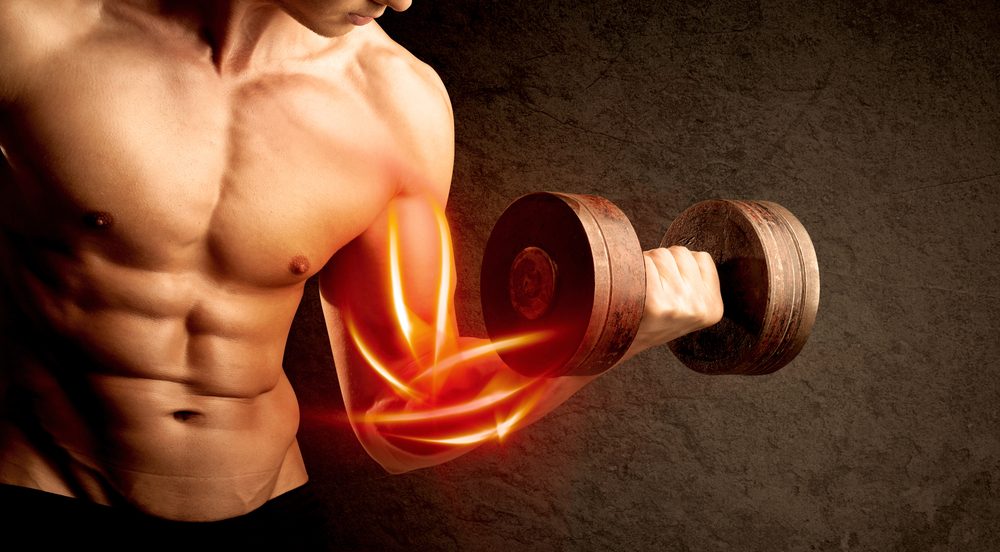Does Genetics Play A Role In Muscle Building? And If So, How Can One Overcome Bad Genetics? Read On..

Let me give you the bad news first: Genetics matter.
That’s the simple truth. As with everything in life, building muscle comes easier to some people than others. I remember almost falling into a small depression a few years ago after seeing a picture of Dwayne Johnson / The Rock from back when he was fifteen. He had just started lifting weights and his lats was already huge, which was something I had been lacking for a long time.
When seeing such obvious genetic differences, you might ask yourself what exactly distinguishes someone with good genetics from someone with average or bad genetics. Here is a list of the most important factors that will play a role in your muscle building success:
3 Most Important Genetic Factors That Influence Muscle Growth
Fast Twitch Vs. Low Twitch Muscle Fibers
There are two general types of muscle fiber: slow-twitch (type 1) and fast-twitch (type 2). Slow-twitch fibers are weaker but able to contract for longer periods of time, which makes them ideal for endurance training and cardio. Fast-twitch fibers are designed for shorter, more intense activity. They possess a greater capacity for strength and size gains.
The ratio of slow-twitch to fast-twitch fibers differs from individual to individual. Someone with more slow-twitch fibers will have an advantage in long distance running, while someone with more fast-twitch fibers will excel in activities such as sprinting or strength training.
The distribution of both types can also differ within each muscle group. For example, you might have more fast-twitch fibers in your chest and legs and thus see faster strength gains in these areas of your body.
Body Type
Even though I am not a big fan of the traditional classifications according to the three somatotypes (ectomorph, endomorph and mesomorph), because they are simply too broad, there is no doubt that people are built differently. Your bone structure and muscle shape are largely determined by genetics and there is little you can do to change them.
Your metabolism also plays a huge goal when it comes to losing and gaining weight. Some people will put on more fat than others, even if both followed the diet and exercise regimen, simply because their bodies burn more calories on a regular basis.
Hormone Levels
On average, men have more than 10 times the amount of testosterone in their blood then women. But even among men, individual hormone levels can vary greatly between individuals. While strength training increases the release of anabolic hormones over time, some people have naturally higher levels, giving them a clear genetic advantage.
Do You Think You Have Bad Genetics? Here’s What To Do!
If you are a beginner and saw little success in the gym so far, you’re probably wondering if you have below average genetics for muscle growth. I know I was when I started out. What you need to know though, is that this question is pointless and even dangerous.
By definition, genetics cannot be changed. We all have to play the cards we’ve been dealt and even if it sometimes seems that way, no one got a perfect hand. Most people use their bad genetics as an excuse for their lack of improvement. Over time they convince themselves that they have tried everything in their power and the only thing holding them back is something out of their reach.
Not only is this mindset toxic for intelligent goal setting, it’s complete nonsense for 99% of trainees out there. Even if you truly have bad genetics, your body is still designed to adapt to its environment, otherwise your ancestors would long have gone extinct. This means that as long as you understand the simple logic behind building muscle and follow a well designed workout and diet plan, you will see results.
Your body might build muscle at a rate slower than normal, but if you trust in the process and give it some time, the results will come. I have yet to see someone who truly committed to the goal of building muscle not look better after a couple of months of training.
How Important Is Genetics In Building Muscle – Summary:
- Genetics matter. Depending on various factors you will build muscle faster or slower than average.
- The most important ones are: Your muscle fiber ratio, body type and hormone levels.
- However, there is no point in convincing yourself that you have bad genetics! You can’t change them.
- Instead, follow a well-designed workout and diet plan and have patience. Muscle growth takes time and dedication but is well worth the price.



